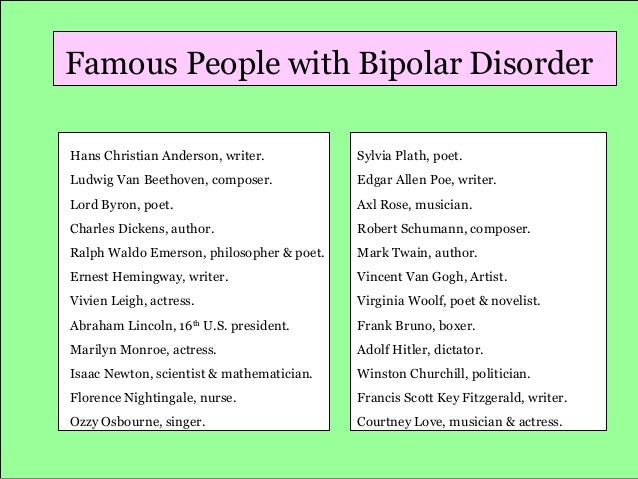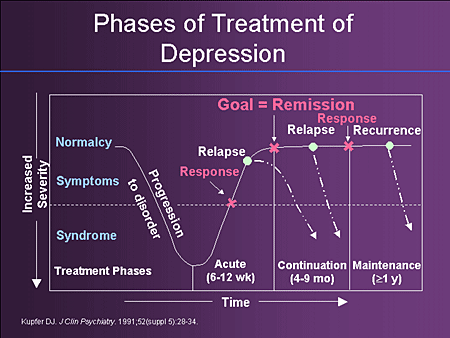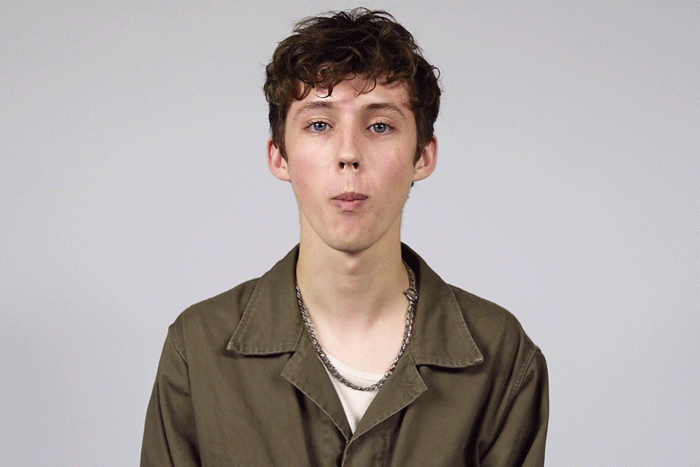Length of time for antidepressants to work
How Long Does it Take for Depression Medication to Work?
It is estimated that 1 in 5 Americans will experience a major depressive episode at some point in their life. Roughly 1 in 10 adults in the United States has had moderate to severe depression symptoms within the past year. For individuals who are living with depression, antidepressant medications can give substantial relief from depressive symptoms.
Treating depression symptoms is critical for mental health and preventing suicide, which is one of the leading causes of death in the United States. But medications used to treat depression don’t work right away. It can take several weeks for a person to start to feel better on antidepressants. This frequently causes people struggling with depression to become discouraged during treatment.
Please continue reading to learn how long it takes pharmaceutical therapy to relieve depression. Also, find out why it takes antidepressants so long to work and what other treatment options can offer faster relief.
How long do antidepressants take to work?
Most patients get some improvement in their symptoms of depression about 1 to 2 weeks after starting antidepressant medicine. However, the first drug that is tried often does not lead to significant improvement in depression symptoms. Therefore, it can take a bit of trial and error to identify the antidepressant medicine that works for you.
How long after taking antidepressants will I feel better?
Generally speaking, you should start to feel better within 4 to 6 weeks and obtain maximum benefit 2 to 3 months after starting antidepressant use. With that said, a person’s response to a specific medicine cannot be predicted. Suppose you do not show any improvement in symptoms of depression after 6 weeks. In that case, your psychiatrist or doctor may change the dose of the drug, switch you to another antidepressant, or add other treatments such as therapy.
Why does it take so long for antidepressant medications to work?
Everyone is different.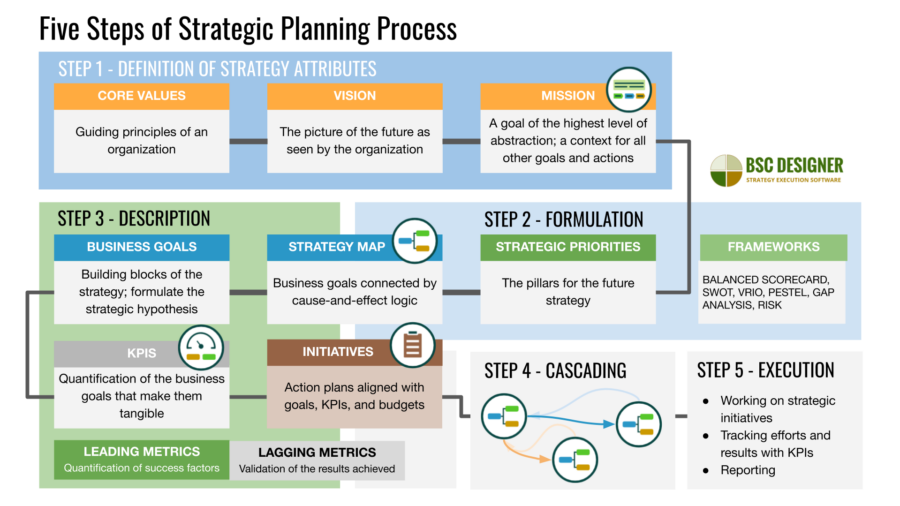 Some people may experience quick relief of symptoms, while others can take considerably longer to benefit from a drug. Many people do not respond to antidepressants at all. To understand why we need to have some background in how brain chemistry works.
Some people may experience quick relief of symptoms, while others can take considerably longer to benefit from a drug. Many people do not respond to antidepressants at all. To understand why we need to have some background in how brain chemistry works.
The most commonly prescribed antidepressants are selective serotonin reuptake inhibitors or SSRIs (examples include Prozac, Zoloft, Celexa, Lexapro, Paxil). These medications work by increasing the amount of serotonin available in the brain. Serotonin is a neurotransmitter that is a mood elevator. SSRIs prevent the reuptake or transport of serotonin back into the neurons. These medicines take so long to work because they inactivate not only the individual serotonin transporters in brain cells but also the genes that code for making the transporters. In this way, over time, SSRIs lead to fewer serotonin transporters in the brain, thus making more serotonin available.
Different people respond differently to antidepressants because each person’s gene expression of the serotonin transporter varies.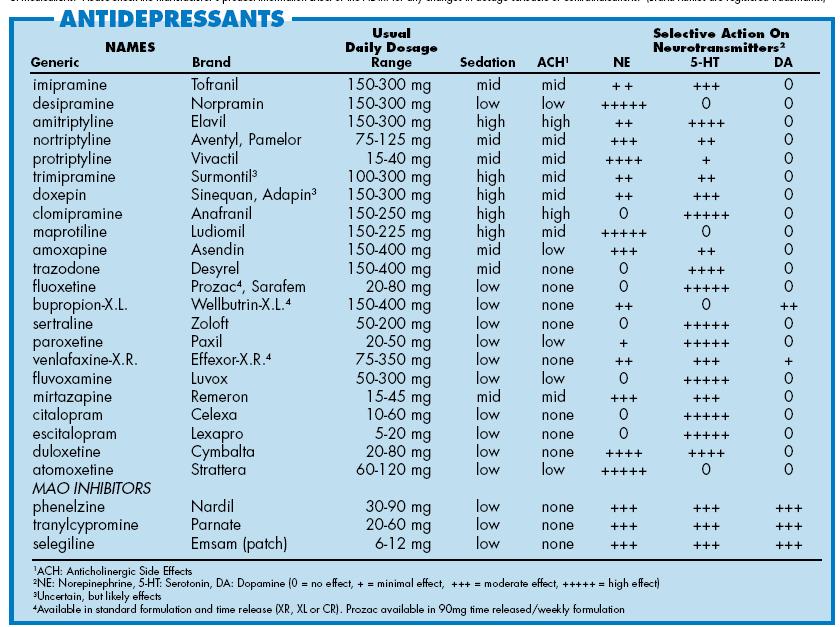 The response to antidepressants is also affected by other factors such as an individual’s metabolism rate, liver function, age, sex, and nutritional status.
The response to antidepressants is also affected by other factors such as an individual’s metabolism rate, liver function, age, sex, and nutritional status.
Can antidepressants work immediately?
Antidepressants will not work immediately. Most patients start to feel better about 6 weeks after starting treatment with antidepressants. It takes this much time for the drug to build up in the body. Your psychiatrist or doctor may increase the dose during this time, depending on your response. It’s important to understand this before starting antidepressants so that you don’t feel discouraged.
If you need faster relief of symptoms, especially if you have anxiety and depression, your doctor may prescribe short-term treatment with medications such as benzodiazepines (examples include Valium, Ativan, Klonopin). These medicines can provide relief much faster than SSRIs or other antidepressants. However, caution is advised because benzodiazepines can be habit-forming (there is a risk of addiction).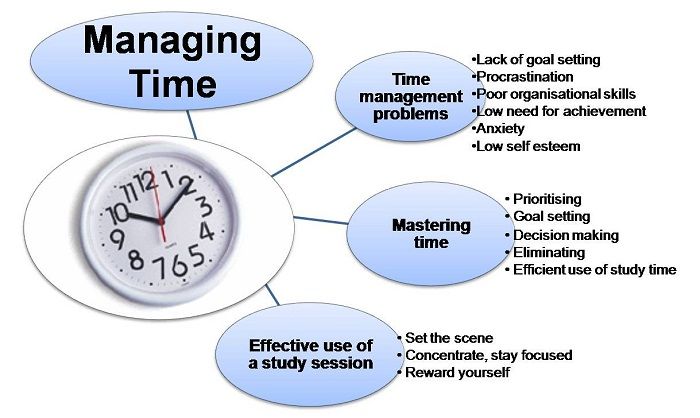 You should talk to your doctor about safer alternatives for faster relief of depressive symptoms, such as propranolol (Inderal) or hydroxyzine (Vistaril).
You should talk to your doctor about safer alternatives for faster relief of depressive symptoms, such as propranolol (Inderal) or hydroxyzine (Vistaril).
What works faster - tricyclic antidepressants TCAs or selective serotonin reuptake inhibitors SSRIs?
There are several different classes of antidepressants, including selective serotonin reuptake inhibitors (SSRIs), tricyclic antidepressants (TCAs), serotonin-norepinephrine reuptake inhibitors (SNRIs), monoamine oxidase inhibitors (MAOIs), and others. Some of these antidepressants work by affecting serotonin, while others affect serotonin and norepinephrine levels in the brain. Different types of antidepressants can take different amounts of time to work.
Some of the most commonly prescribed antidepressants include SSRIs (Prozac, Zoloft) and SNRIs (Effexor, Cymbalta). These types of antidepressants take about 2 weeks to begin working and produce a full effect in around 2 months. However, tricyclic antidepressants are less selective than the other two classes of drugs, i.e., they affect more body systems and cause more side effects.
However, tricyclic antidepressants are less selective than the other two classes of drugs, i.e., they affect more body systems and cause more side effects.
What if I don’t improve on an antidepressant?
As noted above, antidepressants don’t work right away. In someone with mild depression, the effects of the medication may be felt faster. More severe depression can take longer to respond. It could be that you don’t improve even after you take an antidepressant for a few weeks. Don’t let this dishearten you. And don’t stop taking your medicine without consulting your doctor. Just because one medicine didn’t work doesn’t mean your depression is not treatable. It requires patience. Some people may need to change to another medicine because of intolerable side effects from a specific drug. You will need to work with your doctor to figure out what medicine effectively relieves your symptoms without causing side effects.
If you have not experienced relief of depressive symptoms with a particular medicine, your doctor may increase the dose of your medicine, combine it with another medicine, change you to another antidepressant, or recommend starting concurrent psychotherapy or other treatments for depression.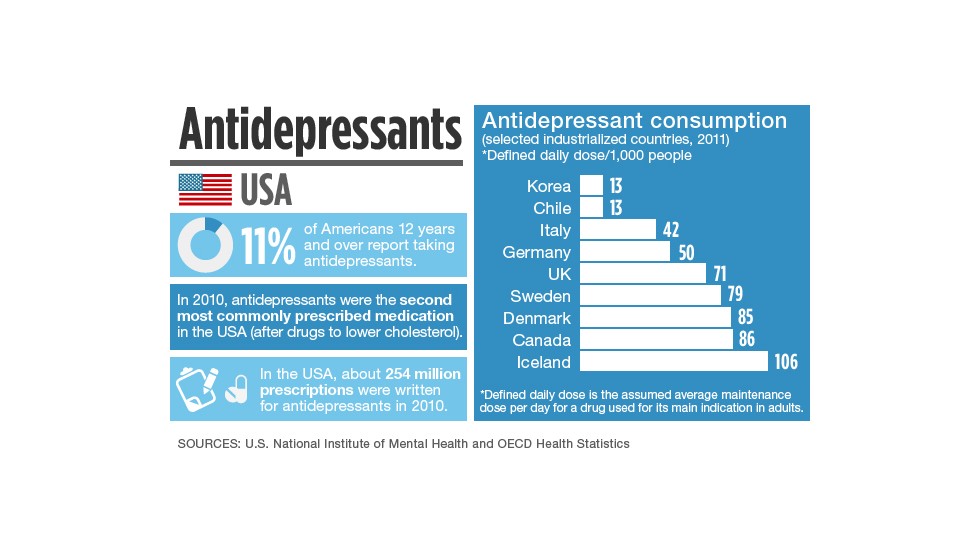
How long does it take to treat depression with medication?
Antidepressants are not designed to provide only short-term relief from depression symptoms. They also prevent future episodes of depression. An untreated episode of major depression can last for around 6 months and has a high chance of recurrence. For this reason, treatment with antidepressants is usually continued for 6 to 12 months, even after obtaining symptom relief. Depending on the severity of your symptoms, your doctor may continue treatment for 3 years or longer.
It is important not to stop treatment as soon as you start feeling better. There is a high chance that your depressive symptoms will return if you discontinue your medication before your doctor says so. To obtain maximum benefits for your mental health, you should take the medication as prescribed. Discuss coming off the medication with your doctor when you feel ready. Your doctor will gradually reduce the dose of your antidepressant medication.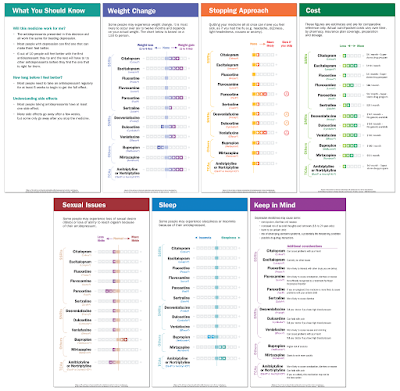 This is to prevent unpleasant withdrawal symptoms that can occur if you stop taking the medication suddenly.
This is to prevent unpleasant withdrawal symptoms that can occur if you stop taking the medication suddenly.
Talk to your doctor about depression treatment
If you have depression symptoms, it is important to be medically reviewed and treated. Taking an antidepressant could be critical for your mental health. You should follow your doctor’s advice, diagnosis, or treatment for depression. As noted, it may take 4-6 weeks for antidepressants to start working. Complete benefit can take 2-3 months. If you don’t get relief with the first drug you try, you may find that switching to another type of antidepressant does the trick.
Keep in mind also that antidepressant medications work best when used in combination with psychotherapy. With a multi-pronged treatment plan in place, your depressive symptoms have a very good chance of improving.
References:
1. https://jamanetwork.com/journals/jamapsychiatry/fullarticle/2671413
2. https://www.cdc. gov/nchs/fastats/leading-causes-of-death.htm
gov/nchs/fastats/leading-causes-of-death.htm
Why Do SSRIs (Antidepressants) Take So Long To Work?
It can be challenging to find an antidepressant that works for you. Learn more about your treatment options for depression, including esketamine for faster relief.
Antidepressants are one of the most commonly prescribed medications in the United States, as more than 1 in 5American adults will experience depression in their lifetimes. Antidepressants can start working within one to two weeks, but for many individuals, relief may not come soon enough. With no end to their suffering in sight, far too many people resort to taking their own lives.
Suicide remains one of the leading causes of death in the nation. Among American teens and young adults, suicide rates are now among the highest on record. Such startling statistics beg the questions: Why does it take so long for antidepressants to work? And what treatment options are available for faster relief?
Feelings of depression or anxiety can lead to suicidal thinking.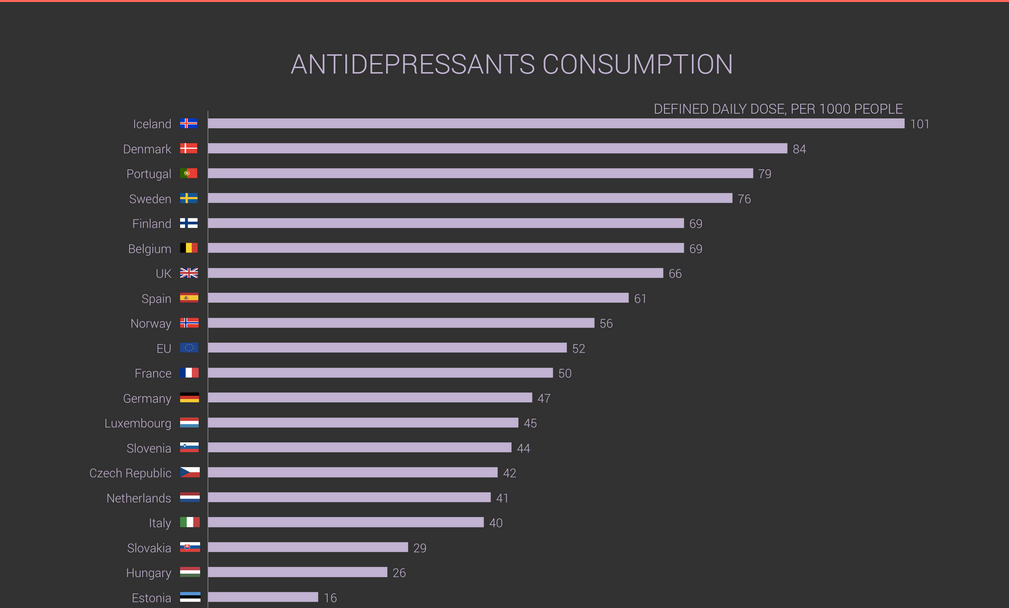 If you or a loved one is experiencing suicidal thoughts or tendencies, call the National Suicide Prevention Hotline at 1-800-273-8255.
If you or a loved one is experiencing suicidal thoughts or tendencies, call the National Suicide Prevention Hotline at 1-800-273-8255.
Time Until Initial Improvement
Initial improvement of depressive symptoms can occur in one to two weeks of starting an antidepressant. However, many people who take antidepressants do not notice a significant improvement in their symptoms with the first drug they try. Moreover, many individuals who do not improve with their first trial of antidepressants fail to respond to subsequent trials. These statistics are concerning because the poor response to antidepressants is predictive of higher rates of chronic depression and poorer overall health.
Timeline for Full Benefits
Generally, most people achieve maximum relief of depressive symptoms within two to three months of antidepressant use. If an individual does not show improvement within four to six weeks of starting an antidepressant, further steps are usually taken. Such steps may include increasing drug dosage, or switching to or adding another antidepressant. Additional steps may include adding other kinds of psychiatric medications, psychotherapy or somatic treatments to care.
Such steps may include increasing drug dosage, or switching to or adding another antidepressant. Additional steps may include adding other kinds of psychiatric medications, psychotherapy or somatic treatments to care.
Variables in Antidepressant Response Time
Some individuals respond more quickly to antidepressants than others, leaving many people wondering, “Why does it take so long for antidepressants to work?” Still, many people do not respond to antidepressants at all. What determines who will and who won’t respond to an antidepressant? To understand the answers to these questions, some basic understanding of how antidepressants work is needed.
The most commonly prescribed antidepressants are known as SSRIs, or selective serotonin reuptake inhibitors. SSRIs work by elevating the amount of serotonin in the brain. Serotonin is the contentment neurotransmitter, a chemical messenger in the brain that activates brain signaling associated with experiencing pleasure and feelings of well-being.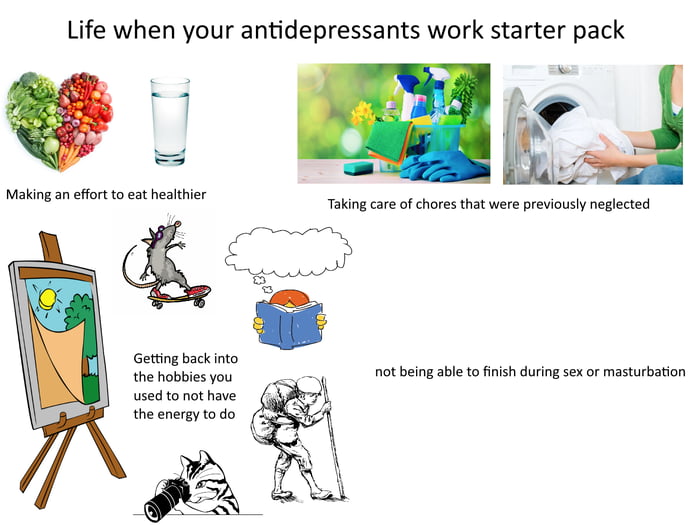 The caveat is that for serotonin to be available for brain signaling, it must be on the outside of the brain’s cells, known as neurons. SSRIs work to inhibit the transporter that recycles serotonin by preventing the transport of serotonin back into the neurons from which it was released.
The caveat is that for serotonin to be available for brain signaling, it must be on the outside of the brain’s cells, known as neurons. SSRIs work to inhibit the transporter that recycles serotonin by preventing the transport of serotonin back into the neurons from which it was released.
Antidepressants take so long to work because they inactivate not just individual serotonin transporters, but also the genes in our DNA that code for the transporter. The result over time is fewer serotonin transporters in the brain and more serotonin around to experience pleasant stimuli. SSRIs work better for some people than others because of individual variations in gene expression of the serotonin transporter. However, we do not yet have enough evidence to support the use of individual genetic testing to treat depression on a case-by-case basis. Additional variables that affect antidepressant response time include those related to drug metabolism: genetic differences in liver enzyme function, liver disease, age, sex, hormones, pregnancy, and nutritional status.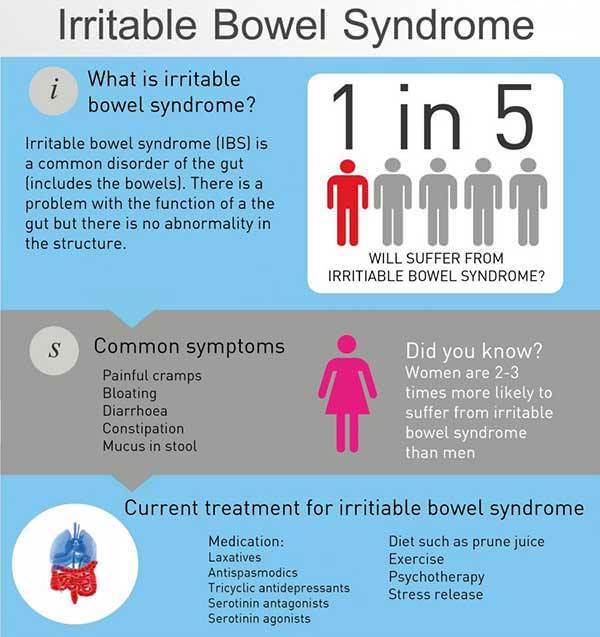
Length of Antidepressant Treatment
Antidepressants are prescribed not just to achieve maximum short-term relief of depressive symptoms, but also as a maintenance treatment to prevent future depressive episodes. Without treatment, a typical major depressive episode will last for approximately six months, has a 50% chance of recurring in six months and an 85% chance of recurring within a decade. For these reasons, antidepressant treatment is typically continued for at least six to twelve months after the resolution of depressive symptoms. In more severe cases, antidepressant treatment may be continued for up to three years, or indefinitely.
Options for Improving the Effectiveness of Antidepressants
There are several treatment options to improve the effectiveness of antidepressants once an antidepressant has been tried for four to six weeks, including:
- Increasing dosage: Antidepressants are started at low doses and then slowly increased.
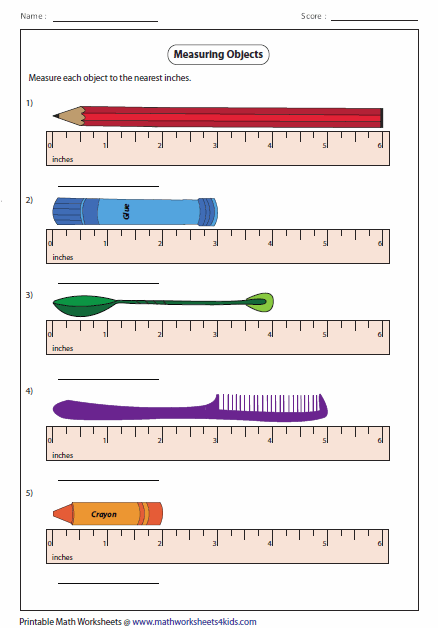 The dose is titrated up until relief of depressive symptoms is optimized and side effects of the drug are minimized.
The dose is titrated up until relief of depressive symptoms is optimized and side effects of the drug are minimized. - Combining medication: When full relief of depressive symptoms is not achieved at the maximum dose of one antidepressant, another antidepressant or an atypical antipsychotic may be added for additional benefit.
- Changing medication: Individuals may switch from one antidepressant to another when they receive no benefit from the first antidepressant or cannot tolerate its side effects. The first antidepressant must be tapered down before it can be completely discontinued.
- Beginning concurrent psychotherapy: It is recommended that treatment with antidepressants be paired with psychotherapy for maximum benefit.
- Engage in somatic treatments: Electrical stimulation of the brain is a common and effective treatment for depression. Common somatic treatments include electroconvulsive therapy (ECT) and repetitive transcranial magnetic stimulation (rTMS).
 These treatments work by stimulating neurons in the brain that are responsible for mood and reality processing.
These treatments work by stimulating neurons in the brain that are responsible for mood and reality processing.
Esketamine for Faster Relief
Finally, for individuals with severe depression who have thoughts of suicide or are exhibiting life-threatening behavior, esketamine is recommended for faster relief. Esketamine, like ECT and rTMS, has a rapid onset of antidepressant action. Unique to esketamine, however, is its ability to significantly improve even the most severe of depressive symptoms within just a few hours or a day.
How does esketamine work so quickly? Esketamine acts on a stimulating neurotransmitter known as glutamate. Glutamate accounts for a significant majority of the brain’s neurotransmitters and may be largely responsible for most brain functions, including mood.
When to Talk to Your Doctor
If you are struggling with depression, visit your primary care provider, or establish care with one you trust. Working with an empathetic, compassionate and collaborative healthcare provider is an important first step in treating depression. The best care teams include a primary care provider, a case manager and a mental health specialist such as a psychiatrist. This kind of care has been shown to deliver the best treatment outcomes for people suffering from depression.
The best care teams include a primary care provider, a case manager and a mental health specialist such as a psychiatrist. This kind of care has been shown to deliver the best treatment outcomes for people suffering from depression.
If you or a loved one struggle with depression and co-occurring addiction, The Recovery Village can help. You can receive comprehensive treatment for both conditions simultaneously from one of several facilities located throughout the nation. To learn more about depression and addiction treatment programs, call The Recovery Village to speak with a representative today.
Editor – Megan Hull
Megan Hull is a content specialist who edits, writes and ideates content to help people find recovery. Read more
Baudry, A; Mouillet-Richard, S. “miR-16 targets the serotonin transpor[…]s to antidepressants.” PubMed Central, September 17, 2010. Accessed June 14, 2019.
Centers for Disease Control and Prevention. “Leading Causes of Death.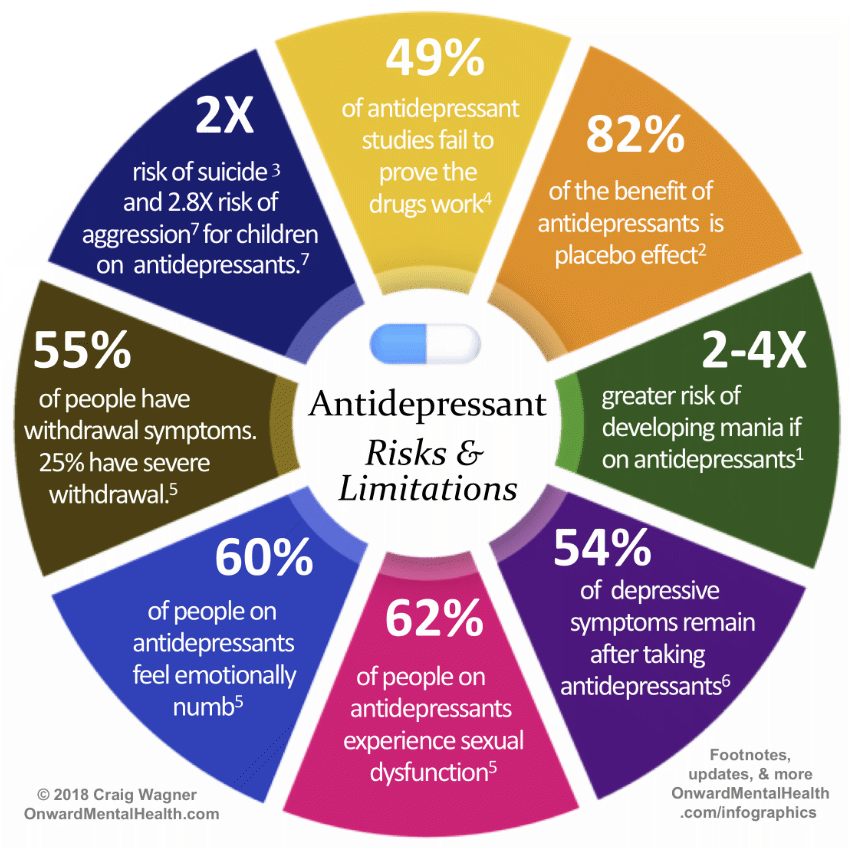 ” March 17, 2017. Accessed June 14, 2019.
” March 17, 2017. Accessed June 14, 2019.
Centers for Disease Control and Prevention. “Suicide Rates in the United States Continue to Increase.” June 14, 2018. Accessed June 14, 2019.
Chen, Jennifer. “How New Ketamine Drug Helps with Depression.” Yale Medicine, March 21, 2019. Accessed June 14, 2019.
Fuentes, Andrea; Pineda, Moises. “Comprehension of Top 200 Prescribed Drug[…]raining and Practice.” PubMed Central, June 2018. Accessed June 14, 2019.
Geddes, JR; Carney, SM. “Relapse prevention with antidepressant d[…] a systematic review.” PubMed Central, February 2003. Accessed June 14, 2019.
Gelenberg, Alan, et al. “Practice Guideline for the Treatment of […] Depressive Disorder.” American Psychiatric Association, November 2010. Accessed June 14, 2019.
Gibson, G. Gordan; Skett, Paul. “Factors affecting drug metabolism: internal factors.” Springer, 1986. Accessed June 14, 2019.
Greden, JF, et al. “Impact of pharmacogenomics on clinical o[…]ed, controlled study.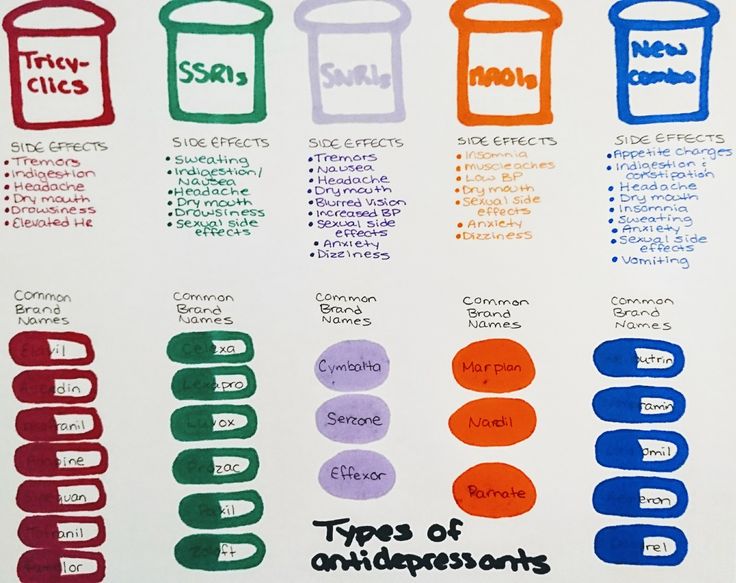 ” PubMed Central, April 2019. Accessed June 14, 2019.
” PubMed Central, April 2019. Accessed June 14, 2019.
Hasin, Deborah, et al. “Epidemiology of Adult DSM-5 Major Depres[…]in the United States.” JAMA Network, April 2018. Accessed June 14, 2019.
Machado-Vieira, Rodrigo, et al. “The Timing of Antidepressant Effects: A […]d Somatic Treatments.” PubMed Central, January 6, 2010. Accessed June 14, 2019.
McIntyre, RS. “When should you move beyond first-line t[…]rapy for depression?” PubMed Central, 2010. Accessed June 14, 2019.
Papakostas, GI, et al. “A meta-analysis of early sustained respo[…] depressive disorder.” PubMed Central, February 2006. Accessed June 14, 2019.
Quitkin, FM, et al. “When should a trial of fluoxetine for ma[…]n be declared failed?” PubMed Central, April 2003. Accessed June 14, 2019.
Serretti, A, et al. “Meta-analysis of serotonin transporter g[…]n depressed patients.” PubMed Central, March 2007. Accessed June 14, 2019.
Sim, Kang, et al. “Prevention of Relapse and Recurrence in […]of Controlled Trials.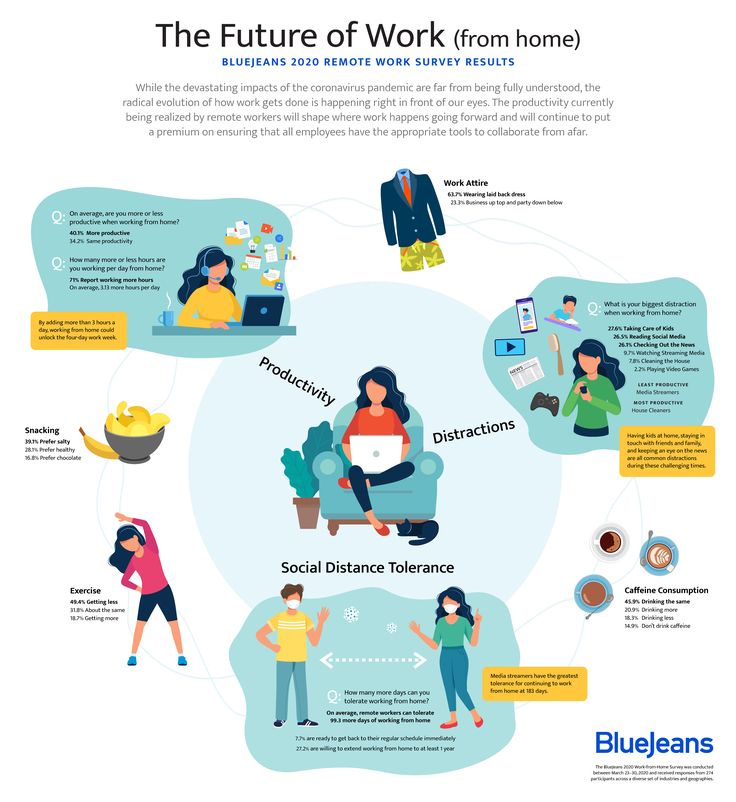 ” PubMed Central, February 2016. Accessed June 14, 2019.
” PubMed Central, February 2016. Accessed June 14, 2019.
Simon, Gregory. “Unipolar major depression in adults: Cho[…]ng initial treatment.” UpToDate, November 12, 2017. Accessed June 14, 2019.
Thase, Michael; Connolly, Ryan. “Unipolar depression in adults: Choosing […]resistant depression.” UpToDate, May 10, 2019. Accessed June 14, 2019.
Medical Disclaimer
The Recovery Village aims to improve the quality of life for people struggling with substance use or mental health disorder with fact-based content about the nature of behavioral health conditions, treatment options and their related outcomes. We publish material that is researched, cited, edited and reviewed by licensed medical professionals. The information we provide is not intended to be a substitute for professional medical advice, diagnosis or treatment. It should not be used in place of the advice of your physician or other qualified healthcare providers.
FGBNU NTsPZ. ‹‹Depression in General Medicine: A Guide for Physicians››
One of the main arguments in favor of the use of first-line antidepressants in the treatment of affective disorders in general medical practice is the minimal (compared to second-line drugs) severity of side effects.
Differences in the complications of thymoanaleptic therapy are clearly seen when comparing the main manifestations of the undesirable effect of representatives of first-line antidepressants (SSRIs, SSOZS) and TCAs, which is clearly demonstrated by the data given in Table. fourteen. nine0003
Nevertheless, it is impossible to completely exclude complications even when using sparing psychotropic drugs. The greatest likelihood of developing side effects of psychopharmacotherapy occurs in patients with somatic diseases, as well as in elderly people who show hypersensitivity to psychotropic drugs; in these contingents, even with careful dose titration, in addition to the main thymoanaleptic effect, side effects may also occur. nine0003
The main side effects of antidepressants include anticholinergic disorders of the central and autonomic nervous system, cardiovascular system, complications from the hematopoietic organs, metabolic and endocrine disorders (weight changes, sexual dysfunction, allergic reactions).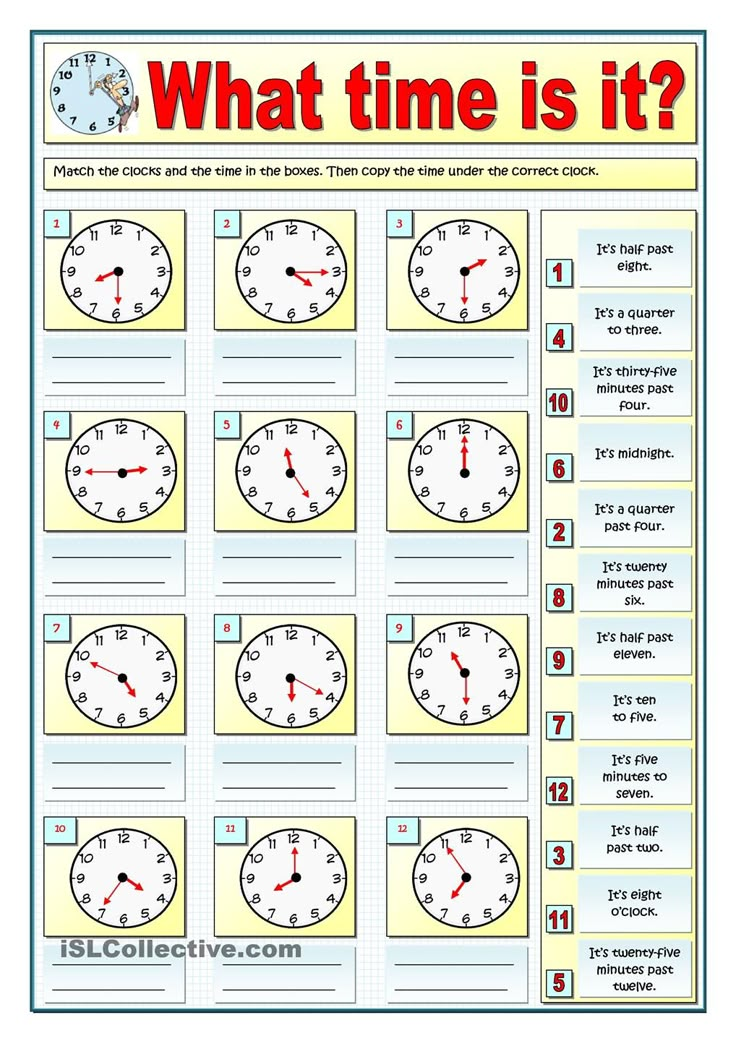
Side effects often appear in the initial stages of treatment (in the first 2 weeks) and sometimes persist for 3-4 weeks of therapy, and then reverse development. For more persistent and at the same time severe disorders, dose reduction is indicated, and, if necessary, therapy is discontinued. nine0003
Treatment with tianeptine (SSOZS) is accompanied by a minimum of undesirable effects. Side effects of the drug are most often limited to complaints of dry mouth, nausea, and drowsiness during the day. Only in some cases, phenomena of transient orthostatic hypotension, dizziness, headaches, skin allergic reactions are also observed. The most common side effects of SSRIs are:
- nausea,
- dry mouth
- loss of appetite, nine0003
- vomit,
- diarrhea,
- constipation.
Along with this, undesirable effects from the autonomic and central nervous system are possible:
- dizziness,
headaches (citalopram)
- insomnia,
- increase (or appearance) of anxiety,
- nervousness
- a sense of inner tension.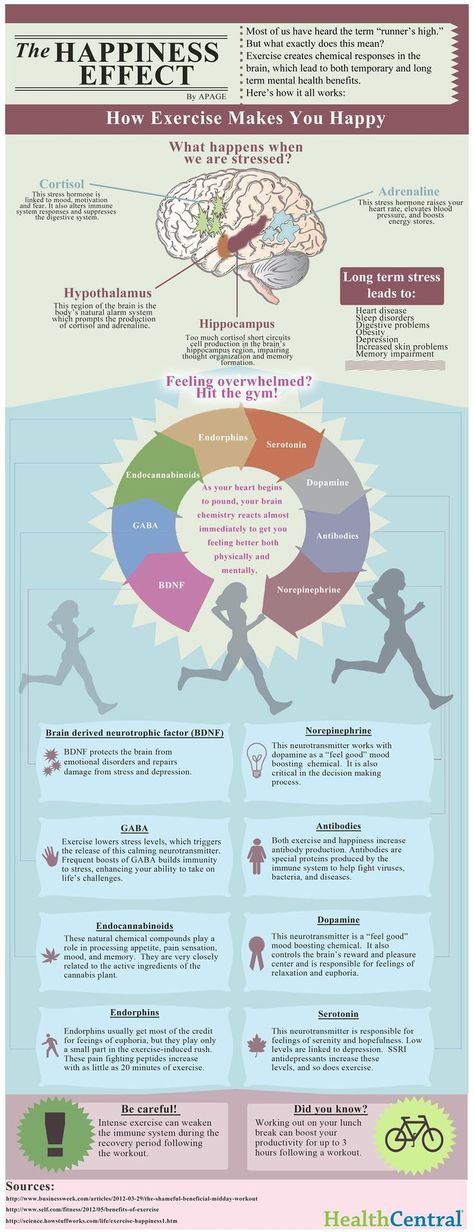
The latter appear in the first weeks of treatment or with increasing doses. nine0003
There are transient extrapyramidal disorders in the form of tremor. As for other disorders (parkinsonism, akathisia, dyskinesias), judging by the data of a number of publications, they are recorded only in individual cases. The use of fluoxetine and paroxetine may be accompanied by increased bleeding and even bleeding.
During SSRI therapy, neurotoxic reactions (serotonin syndrome) affecting the gastrointestinal tract and nervous system (colic in the abdomen , flatulence, loose stools, nausea, vomiting; tremor, dysarthria, muscle hypertonicity, hyperreflexia, myoclonic twitching, ataxia) are possible. In more severe cases, hyperthermia, confusion, symptoms of disorientation join [Malin D.I., 2000]. nine0003
Severe complications often occur in the process of drug interaction with combined use:
- SSRIs and MAOIs,
- SSRIs and OIMAO-A (moclobemide),
- TCA (anafranil) and OIMAO-A.
Along with side effects, the effects of antidepressants associated with overdose are of great importance (especially in the context of a general medical network). The risk of deliberately taking large amounts of drugs for suicidal purposes poses a safety advantage to first-line antidepressants. This is evidenced by comparative data on the safety of some first-line and second-line antidepressants, presented in Table. fifteen. nine0003
The safety of first-line drugs is indicated by the data of C. Las-mier et al. (1991) in relation to tianeptine. Taking large doses of this drug (from 12 to 60 tablets) (12 cases of suicidal use of tianeptine are summarized) does not lead to death and is not accompanied by significant (compared with the norm) deviations of the clinical and electrocardiological parameters of the cardiovascular system.
Table 15. Safety of antidepressants [based on R. Priest, D. Baldwin, 1994]
| Preparations | Hazard measure (number of deaths from overdose per 1 million prescriptions) | Degree of danger |
| First line antidepressants | ||
| Fluoxetine (Prozac) Fluvoxamine (Fevarin) Mianserin (Lerivon) | Less than 10 | Relatively dangerous |
| Second line antidepressants | ||
| Clomipramine (Anafranil) Maprotiline (Ludiomil) Trazadone (Tritgiko) | More than 10 | Potentially dangerous |
| Imipramine (Melipramine) Phenelzine (Nardil) | Over 20 | Dangerous |
| Amitriptyline Trianylcypramine (transamine) | Over 40 | Very dangerous |
With an overdose of milnacipran (ixel), vomiting, hyperventilation, and tachycardia are observed.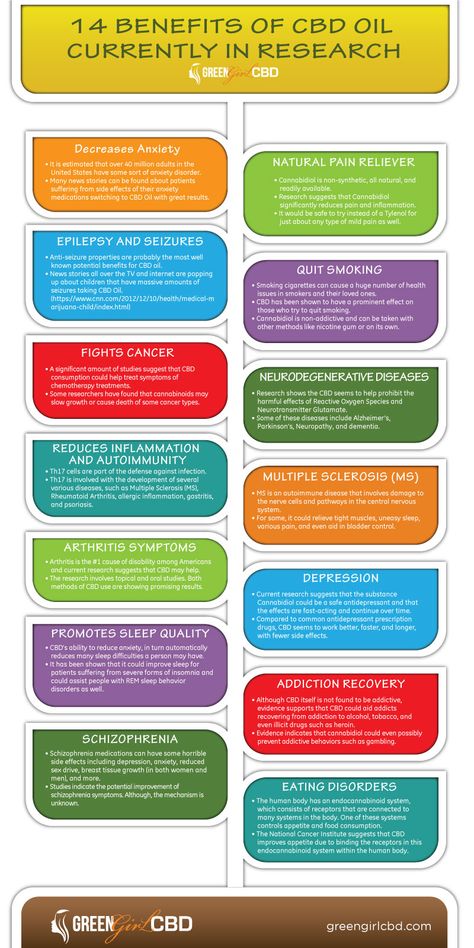 However, even taking excessively high daily amounts of the drug (1900-2800 mg) does not lead to severe complications and results in complete recovery [Montgomery S. A. et at, 1996].
However, even taking excessively high daily amounts of the drug (1900-2800 mg) does not lead to severe complications and results in complete recovery [Montgomery S. A. et at, 1996].
Taking mirtazapine (Remeron) in excessive doses (up to 315 mg - 4 observations) is accompanied only by transient somnolence without impaired respiratory and cardiovascular functions [Montgomery S.A., 1995].
What you should know about antidepressants
Ekaterina Kushnir
treats anxiety disorder
I have generalized anxiety disorder.
For a long time I coped without pills and other help, but one day I got tired of constant anxiety and began to interfere with my normal life. As a result, I turned to a private psychiatrist.
The doctor prescribed an antidepressant from the SSRI group - these are selective serotonin reuptake inhibitors. Such drugs are the first thing prescribed in the treatment of depression and a number of other conditions, including my illness.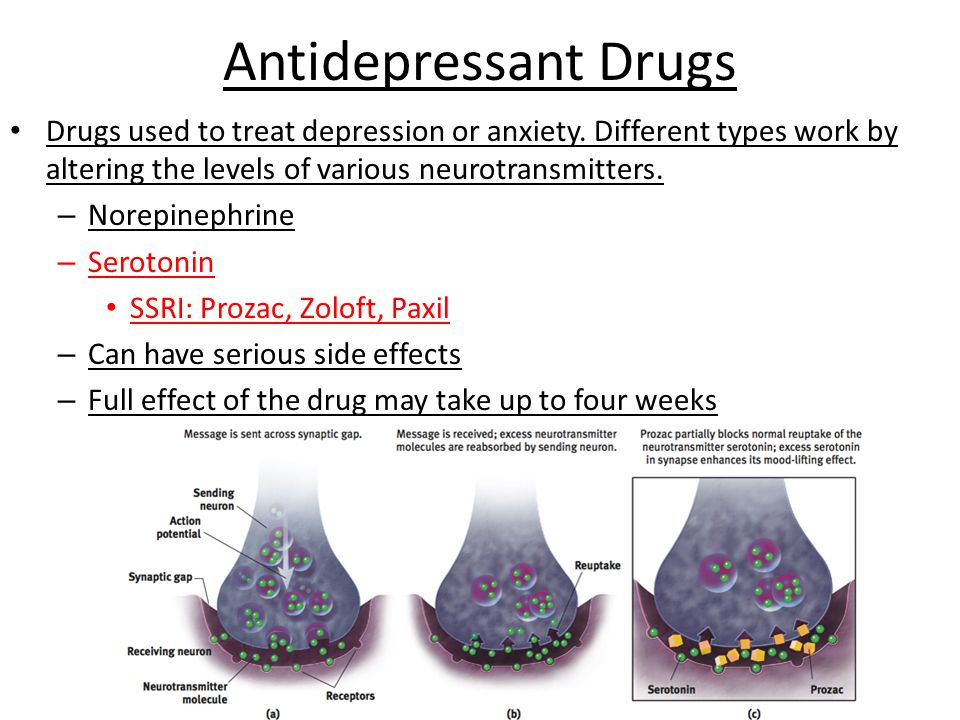 nine0003
nine0003
The doctor immediately warned me about some peculiarities associated with taking the drug. Some of them I then felt on myself. I think everyone who plans to be treated with antidepressants should know about them.
At the same time, it should be taken into account that most of the negative effects of therapy are temporary and not dangerous, and if they do not go away, one medicine can be replaced with another. Antidepressants help many people with mental disorders and other illnesses get rid of their symptoms and return to a full life, so you definitely should not be afraid of them. The main thing is to take such drugs when they are really needed: as prescribed by a competent doctor and under his control. nine0003
See a doctor
Our articles are written with love for evidence-based medicine. We refer to authoritative sources and go to doctors with a good reputation for comments. But remember: the responsibility for your health lies with you and your doctor. We don't write prescriptions, we make recommendations. Relying on our point of view or not is up to you.
We don't write prescriptions, we make recommendations. Relying on our point of view or not is up to you.
Fact No. 1
Antidepressants may make symptoms worse at firstAntidepressants can increase anxiety in anxiety disorders, as well as cause irritability and agitation - the so-called causeless motor agitation, the inability to sit still. It's not dangerous, but rather unpleasant. This condition is sometimes referred to as initial anxiety, that is, the anxiety of starting therapy. Up to 65% of people face it. nine0003
Antidepressant-induced anxiety syndrome - a systematic review in the British Journal of Psychiatry
There is also evidence that some classes of antidepressants, including SSRIs, may increase suicidal ideation in depression in young people aged 18 to 24 years. These data are not very reliable, and in older people, the risk of suicide no longer increases and even decreases.
Without treatment, depression is more likely to lead to suicidal thoughts, and in case of anxiety, you just need to prepare for such an effect, then it will be easier to survive the attacks.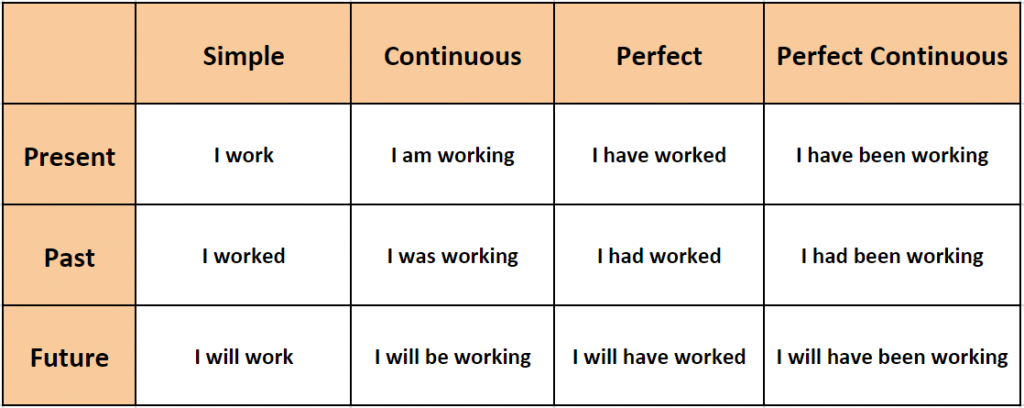 nine0003
nine0003
The doctor told me that in the first two or three weeks there may be an increase in anxiety, but I did not take it too seriously.
Everything was fine for the first week. After about seven days, I became nervous and irritable. And then I woke up at night and after a while I felt an incomprehensible fear. My heartbeat increased, my head was spinning, my throat was constricted. Because of this, I felt a real panic - I spent the rest of the night fighting terrible thoughts, in the morning I got up completely broken. nine0003
/list/antidepressant-myths/
8 myths about antidepressants
I have never had such panic attacks before medication - my anxiety was background, general. I got scared and wrote to the doctor, who reassured me and said that it was not dangerous and would pass soon.
After that, I already expected these panic attacks, immediately tried to relax, calm down, remember that this was just a temporary effect of the drugs.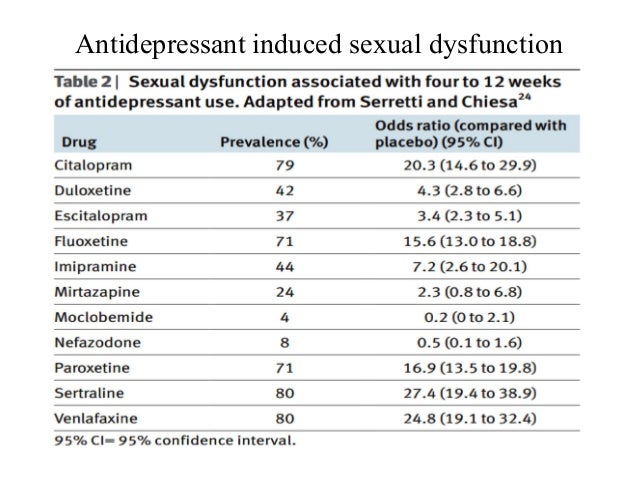 And they ended faster, and then they completely disappeared.
And they ended faster, and then they completely disappeared.
Fact No. 2
The effect of antidepressant treatment will not be immediateIncrease the dose of antidepressants gradually to reduce side effects. They usually start with the minimum, and then bring it up to the working one. For example, for SSRIs with the active ingredient "sertraline", the working dose is from 100 mg per day. I started taking such a drug with 25 mg, and then gradually, in several steps, under the supervision of a doctor, raised the dose to 100 mg.
SSRI dosage - NHS
What doses of antidepressants will be optimal - an article in The Lancet
The process of reaching a working dose can take from two weeks to a month or more. It depends on the drug and its tolerance. I turned out to be sensitive to the medicine, it was hard for me to survive every increase in dosage: anxiety increased again, there were other side effects that then stopped.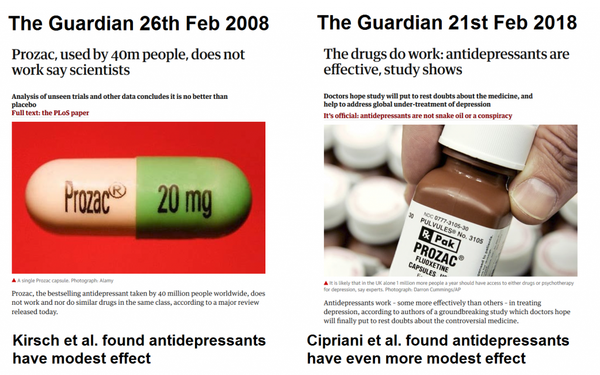 However, this is not the case for everyone, sometimes the process goes faster.
However, this is not the case for everyone, sometimes the process goes faster.
The full therapeutic effect, that is, the disappearance or a strong improvement in the symptoms of the disease, occurs some time after reaching the working dosage. As a rule, this is a week or two, although some positive changes may be earlier. For some people, this process stretches for a longer period: 6-12 weeks. Minimum initial doses of drugs usually do not work. nine0003
It is better to prepare for the fact that the symptoms of the disease will not disappear in the first weeks of treatment. And remember - this does not always mean that the drug needs to be changed, sometimes you just need to wait or further increase the dosage under the supervision of a doctor.
Fact No. 3
Antidepressants are usually taken in combination with other drugs Another way to mitigate the side effects of antidepressants is to prescribe an additional drug along with them: for example, from the group of tranquilizers. Such drugs may have their own side effects, they should not be taken for a long time. Unlike antidepressants, some of them can be addictive. They are usually appointed for a month, but this period may be shorter or longer. nine0003
Such drugs may have their own side effects, they should not be taken for a long time. Unlike antidepressants, some of them can be addictive. They are usually appointed for a month, but this period may be shorter or longer. nine0003
Antidepressants together with benzodiazepines work better for depression - BMJ magazine
My doctor prescribed a rather mild drug for me. However, he did not suit me. At first, it caused increased drowsiness: during the period of increased anxiety, it went away for a while, but then returned - even with half a pill I turned off and could sleep all day. And if I drank at night, I woke up with difficulty in the morning. The psychiatrist prescribed another medicine, but I could not buy it: the drug was not available in any pharmacy nearby. nine0003
As a result, I simply endured all the side effects of therapy - they were unpleasant, but tolerable. When discussing with the doctor, she called this option acceptable if the side effects of the second medicine only worsen the situation.
Fact No. 4
Side effects are not always, but they areModern antidepressants, including SSRIs, are mild and have almost no side effects. Older drugs - tricyclic antidepressants and monoamine oxidase inhibitors - cause more side effects. Doctors usually use them when milder first-line drugs don't work or when they can't be prescribed. nine0003
Side effects of antidepressants - the National Health Service of the UK
Side effects of various antidepressants - Uptodate
Side effects of antidepressants and their impact on the treatment of a large depressive disorder - the journal NATURE
STRICTIC STRICTIC OF REDITION
. effects of antidepressants - advice from the Mayo Clinic staff
Choosing an SSRI drug does not guarantee the absence of side effects - many people tolerate treatment easily, but sometimes a change in drug may be necessary.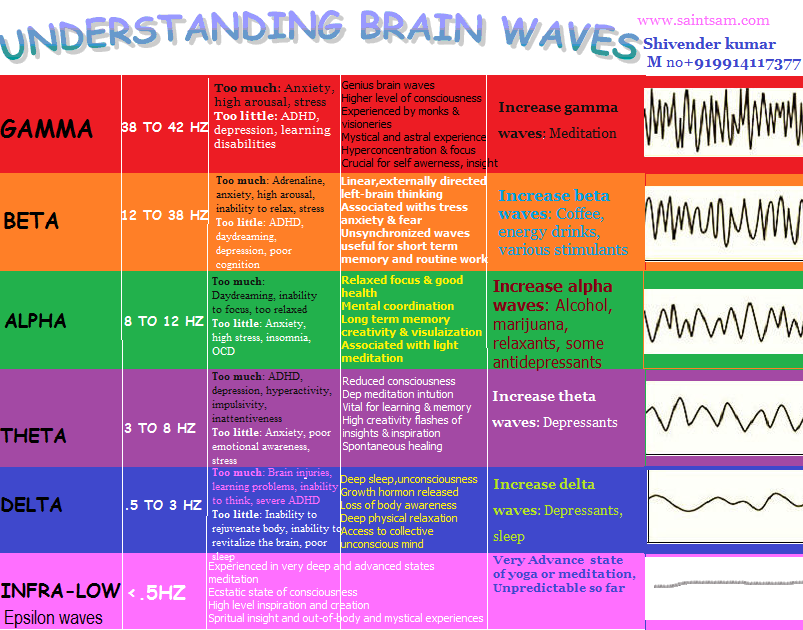 nine0003
nine0003
The first couple of weeks of taking there is a risk that the state of health will be so-so - it's worth thinking about. It may be worth scheduling the start of therapy on vacation.
I work remotely, and it was easier for me: the first pill was taken on Saturday, I slept through the weekend. Then she continued to work, but refused any additional loads: housework, part-time jobs, training and everything else.
It was hard work: I wanted to sleep, then I began to worry and get distracted. I also had diarrhea, nausea, headaches, tremors, i.e. hand trembling, hot flashes, sweating, palpitations. At night, panic attacks began, in the morning I had difficulty getting up because I was in pain and dizzy. nine0003
There are mixed data on how common the side effects of antidepressants are. If we summarize them, then the numbers look something like this:
- nausea - about 25% feel it;
- diarrhea - it happens in 15% of people, and 5%, on the contrary, will have constipation;
- sweating and a feeling of heat occur in about 20% of people;
- sexual dysfunction, decreased libido may occur in 80% of cases;
- insomnia - in 11% of cases;
- headache and dizziness - in about 10-11% of cases; nine0262
- weight gain - not all drugs give this effect.
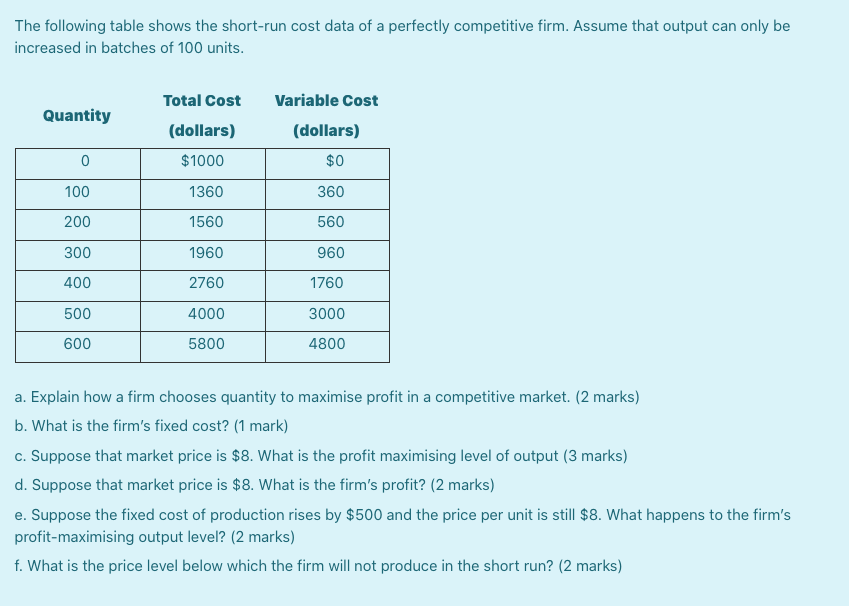 Some, on the contrary, can reduce weight. On my medicine, I lost 2 kilograms in the first month, despite the fact that I quit training due to poor health. True, then they returned back.
Some, on the contrary, can reduce weight. On my medicine, I lost 2 kilograms in the first month, despite the fact that I quit training due to poor health. True, then they returned back.
It can be seen that most side effects occur in less than half of the cases. In addition, in most cases they pass in the first weeks and are not dangerous.
Side effects not listed above are very rare. I was "lucky", and I faced one such - a decrease in visual acuity. Once in the morning I noticed that I see worse without glasses. A little later, I realized that something was wrong with the glasses. nine0003
I wrote to the doctor, she replied that this happens, as a rule, is not dangerous and passes, but it is better to visit an ophthalmologist. I went to the ophthalmologist, everything was fine with my eyes, there was nothing terrible, but my vision really worsened - it was not a subjective feeling. On the right eye, it was -0.5 diopters, it became -0.75, and on the left eye it was -1. 5, and it became -3.5.
5, and it became -3.5.
I was offered to try changing the drug, but I decided to wait. Vision was then restored. I have not yet gone to the doctor to have it measured, but according to subjective feelings, it is at the same level as before: I am comfortable again in my glasses. nine0003
Side effects should not be tolerated - if something greatly worries, scares or interferes with life, it is better to tell the doctor right away. The psychiatrist will be able to determine whether the side effect of the drug is dangerous and whether it is worth continuing to take it. There are several antidepressants of the SSRI group, in addition, there are groups of drugs with a slightly different mechanism of action. As a rule, doctors manage to find a medicine that gives a good effect without side effects.
If there is no danger, the doctor can adjust the dose or increase it more gradually - this often helps to cope with unpleasant effects. nine0003 I wrote to the doctor again when my visual acuity decreased
Fact No. 5
5
Antidepressants are not drugs that you can stop drinking as soon as you get better. They are taken for a long time: usually from several months, less often several years.
Anxiety Therapy - UpToDate
For example, for generalized anxiety disorder, the duration of treatment is at least a year. Moreover, the date is not counted from the very beginning, but from the moment when a lasting effect appeared from the pills. In fact, they will have to be drunk for about 1.5 years - it depends on how long it takes to reach the working dosage of the medicine. nine0003
The cost of a package of the most famous antidepressant "Zoloft" is about 700 R, enough for about a month. That is, a course of therapy will cost about 10,000 R - maybe more or less, depending on which drug is selected.
Psychotherapy review - UpToDate
Another drug of the same group already costs more than 2000 R per pack. Source: rigla.ru The cost of an appointment with a good psychiatrist in Moscow is 3000-5000 R.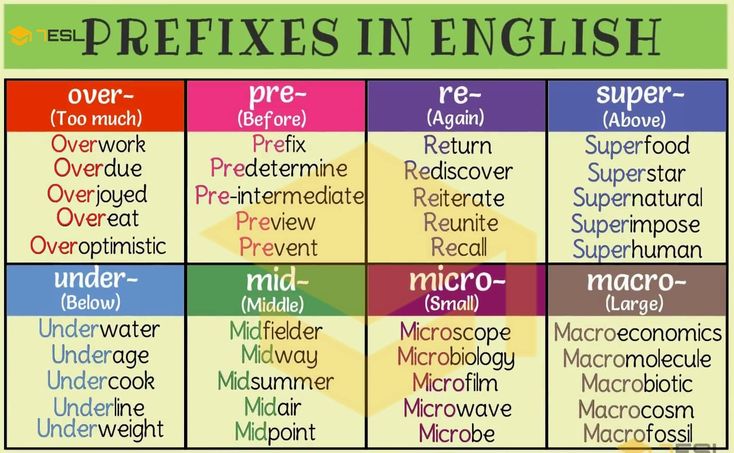 At first, you will need to visit him about once every 1-1.5 months, then less often. nine0003
At first, you will need to visit him about once every 1-1.5 months, then less often. nine0003
You can apply to the psycho-neurological dispensary at the place of residence under compulsory medical insurance - it's free. At the same time, they will not put you on psychiatric registration: it was canceled in 1993. People with disorders that do not threaten their lives or those around them are on consultative and diagnostic care. If you stop going to the doctor, he will not find out what happened: a person seeks help at will.
Psychotherapy, usually cognitive-behavioral, is also commonly prescribed to enhance and sustain the effects of antidepressants. In many cases, it improves the effectiveness of drugs, including depression and generalized anxiety disorder. An appointment with a psychotherapist in Moscow costs an average of 5000 R. For treatment, you will need about 10 sessions or more. nine0003
/psychotherapy/
How psychotherapy works
Fact No.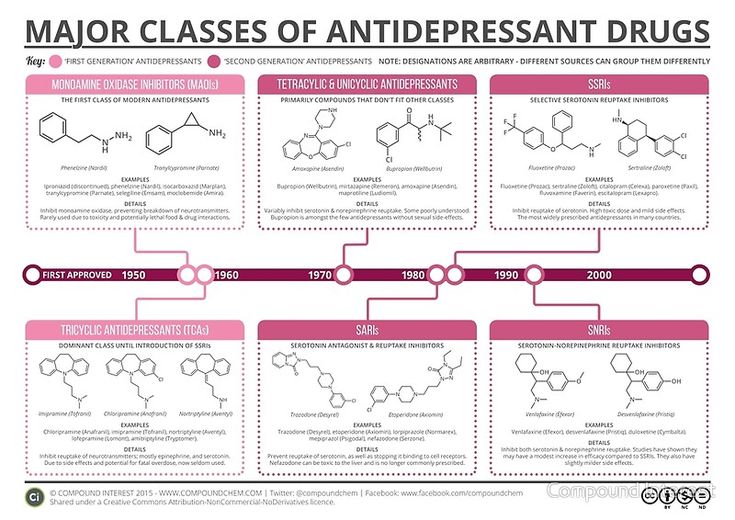 6
6
Antidepressants do not develop dependence. However, if you abruptly stop drinking them, there will be a withdrawal syndrome. This is felt as electric current discharges while moving or turning the head, headaches, dizziness, insomnia. Many people experience symptoms similar to the flu or an intestinal virus: low fever, diarrhea, general malaise, chills. Often there is anxiety, there are intrusive images. nine0003
Withdrawal symptoms after taking serotonin reuptake inhibitors - Journal of Clinical Psychiatry
How difficult it is to stop taking antidepressants - American Psychological Association
Stopping antidepressants in adults - UpToDate
If you for some reason have stopped taking your pills treatment, they should be canceled only under the supervision of a doctor.
Antidepressant withdrawal occurs as gradually as the start of treatment. The dosage is slowly reduced, usually at this time again a cover-up drug is prescribed to alleviate side effects.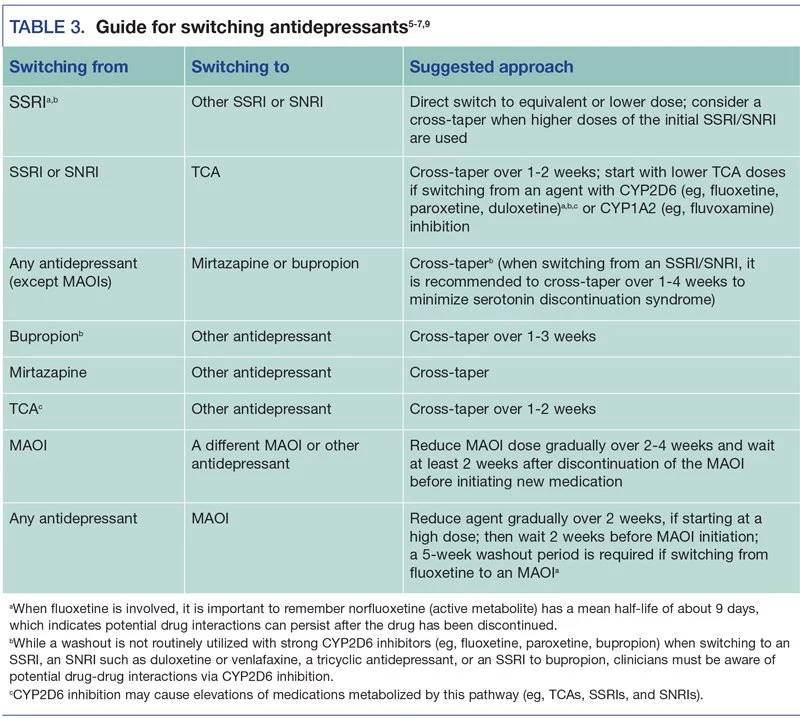 As a rule, this is the same medicine that was at the beginning of the intake. nine0003
As a rule, this is the same medicine that was at the beginning of the intake. nine0003
Withdrawal is usually harmless and resolves within the first weeks of stopping the drug. Sometimes even within a few days - it still depends on which medicine was prescribed. If severely disturbing symptoms appear during the withdrawal period, you should consult a doctor.
Fact No. 7
If you need to change the drug, everything will start overIt is far from always possible to immediately find the right antidepressant - sometimes the side effects do not go away and you need to take a new one. nine0003
Changing antidepressants in adults - UpToDate
Serotonin syndrome - MSD
Most often, it is started again with a small dosage, this delays the process of obtaining the effect of treatment. The new drug may also have side effects - the same or different. We will have to wait again until they pass.
You won't be able to change the drug on your own, since all antidepressants are sold only by prescription - and that's good.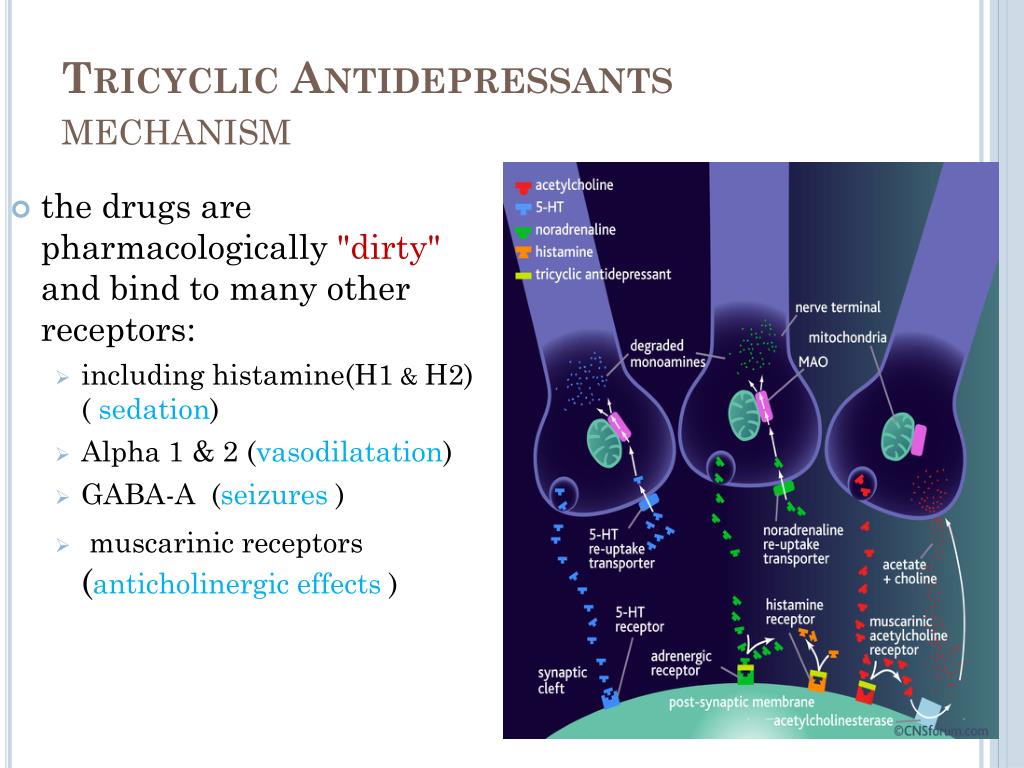 Switching from one drug to another can be dangerous if you do not know the characteristics of different groups of drugs. nine0003
Switching from one drug to another can be dangerous if you do not know the characteristics of different groups of drugs. nine0003
For example, taking SSRIs is possible only some time after the withdrawal of antidepressants from the group of monoamine oxidase inhibitors - due to the risk of developing serotonin syndrome. This is a potentially fatal condition, accompanied by a change in mental state, high fever, increased muscle tone and other symptoms.
If the drug is changed correctly, there will be no dangerous negative effects, so consultation with a doctor is required.
/psychotherapy-search/
How to choose a psychotherapist
Fact No. 8
Among antidepressants there are original drugs and generics Preparations may be original or generic. Originals are medicines first released by some pharmaceutical company that have passed all clinical trials and checks. Generics are drugs with the same active ingredient from another pharmaceutical company, that is, copied from the original drug.
Theoretically, the action of generics should not differ from the action of original drugs. However, this is possible, since generics may contain other additional substances or the manufacturer may use other raw materials. nine0003
Due to my anxiety, I did not read anything in detail about specific drugs before I bought my first antidepressant in a pharmacy so as not to be scared and not think about taking it. I also didn’t think to ask the doctor about this question.
/list/covid-depression/
Psychoneurological complications after covid: memory problems and depression
As a result, I first bought a generic because it was in stock. Then it turned out that, after all, according to the experience of my psychiatrist, the original drug often gives fewer side effects and is better tolerated. As a result, I changed the generic to the original drug - and, indeed, the side effects softened. nine0003
In my subjective opinion, which is supported by some data, in the case of antidepressants and other psychotropic drugs, you should always choose the original medicine. Moreover, the cost of originals and generics is not always very different.
Moreover, the cost of originals and generics is not always very different.
Originals and generics of some SSRIs
| Active ingredient | Original | Original cost | Generics | Cost of generics |
|---|---|---|---|---|
| Sertraline | Zoloft | About 700 R, 100 mg tablets | Serenata, Sirlift | 500-600 R 100mg tablets |
| Escitalopram | Cipralex | 3000 R, tablets 10 mg | "Selektra", "Elycea" | 500-1300 R, tablets 10 mg |
| Fluoxetine | Prozac | About 350 R, 20 mg tablets | Profluzak, Fluoxetine | 100-200 R, tablets 20 mg |
CERTRALIN
Original
Zoloft
Original cost
about 700 r, tablets 100 mg
generics
“Serenata”, “Cerelift”
Cost of
9000 500-600 r. , tablets 100 mgEscitalopram
Original
Cipralex
Original price
3000 r, tablets 10 mg
generics
“Checkra”, “Elice”
Cost of generic
500-1300 r, tablets 10 mg
Flioxetin
Prose “Prose”
Cost cost
Cost original
About 350 R, tablets 20 mg
Generics
Profluzak, Fluoxetine
Cost of generics
100—200 R, tablets 20 mg
one remained unclaimed Fact No.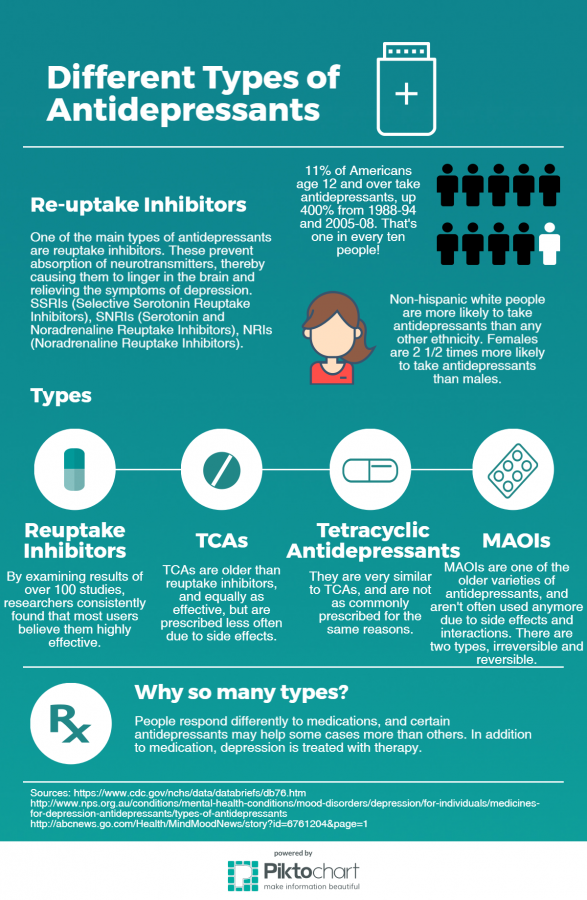 9
9
Drinking alcohol while taking antidepressants may exacerbate unpleasant side effects. Also, alcohol is a depressant, that is, it has the opposite effect, and its intake can adversely affect the results of treatment.
Why you shouldn't mix antidepressants and alcohol - Mayo Clinic
Alcohol is strictly forbidden to drink with some groups of antidepressants, for example, tricyclic antidepressants and monoamine oxidase inhibitors: combination with the latter, for example, can lead to an uncontrolled increase in pressure. MAO inhibitors in general require a special diet - it is unlikely that a doctor will prescribe such drugs as the first antidepressants, but if necessary, he will issue a list of what is allowed and prohibited. nine0003
With other antidepressants, moderate use may not be dangerous and may even pass without consequences, but doctors still recommend abstaining so as not to increase side effects and improve treatment outcome.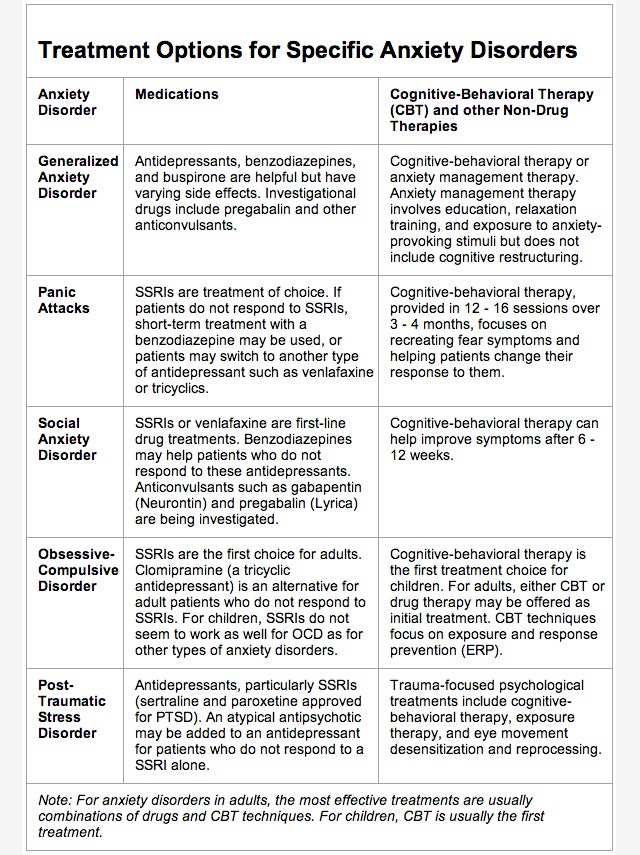
The main thing is not to temporarily stop taking the drug in order to drink. This can lead to the development of a withdrawal syndrome.
/trevoga/
How I Treated Generalized Anxiety Disorder under CHI
Fact No. 10
Antidepressants are incompatible with certain drugs and have contraindications nine0179It is important to tell your doctor what medications you are taking and what chronic illnesses you have. For example, SSRIs may not be suitable for epilepsy and bleeding disorders, and tricyclic antidepressants are usually not prescribed for those who have recently had a heart attack, suffer from glaucoma, or porphyria.
Antidepressant Warnings - NHS
Drug Compatibility Test - Drugs.com
It is also important to be careful if you are about to take any over-the-counter medicine. For example, ibuprofen, which people often take on their own to relieve pain and reduce fever. It should not be taken with SSRIs as it increases the risk of gastrointestinal side effects.
